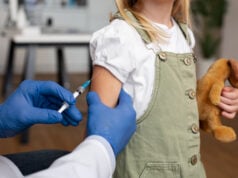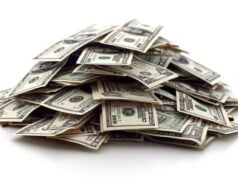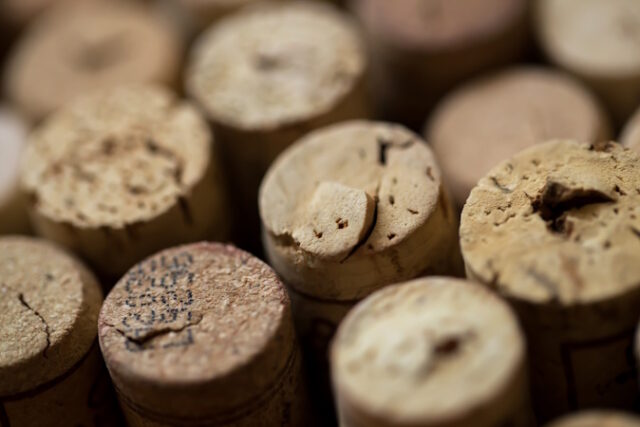
By Tom Marquardt And Patrick Darr
When Anne Bousquet grew up helping her father make wine in southern France, the last thing she wanted to pursue as a profession was wine. It was hard work for a kid and she wasn’t old enough to enjoy the fruits of her labor. But life can throw you a lot of curves and today she and her husband are leading one of the top-producing wineries in the Uco Valley region of Argentina.
How she got from France to Argentina is loaded with curves.
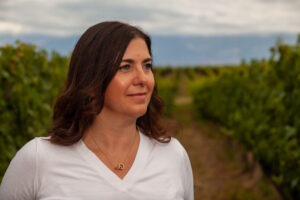
The story begins as an exchange student in St. Cloud, MN, whose brutal winter was a cruel contrast to the weather in the picturesque village of Carcassonne, France. But among the exchange students from other countries was her future husband — Labid Ameri from Spain. She was studying to be an economist and he was pursuing a career as a stockbroker. Eventually, they landed well-paying jobs in Boston while Anne’s father, Jean, continued to make wine. But, after falling in love with Argentina while he was on vacation, Jean decided to sell everything when he was 50 years old and buy virgin land in the remote Gualtallary Valley. No one else was growing vines here in the mid-1990s, but all Jean’s intuition and training as a grape grower told him this was an ideal location for a vineyard. Unlike southern France where the abundant rain made it difficult to farm organically, the arid valley afforded him the opportunity to grow grapes without the use of pesticides, herbicides and artificial fertilizer. It was Jean’s dream – but not yet Anne’s dream.
“I thought he was crazy,” Anne said in a recent interview over lunch and a tasting of Domaine Bousquet’s vast portfolio of wines. “I mean, he’s living in southern France. Then Argentina? Crazy. But I was in denial. He can do anything he wants, I thought. I had my own thing going.”
Many people said he was crazy, including Argentinians who thought it was too cold to grow grapes at an elevation of nearly 5,000 feet. There wasn’t even a source of water or electricity on this land. But Jean drilled his own well to supply nourishment for new wines.
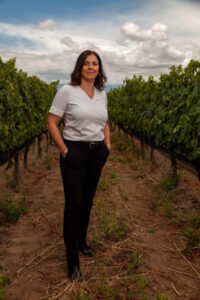
On top of those obstacles, ants love the sandy soil and form a conga line from the delicious vine leaves to their nests on adjoining properties. Anne is obsessed with them, but there are few sustainable weapons in her quiver to fight them.
Finally, Anne was getting curious and with her husband decided to visit her father for a couple of weeks. Now, it was their turn to fall in love with a region that had a mountain range as a backdrop. Anne said it immediately impacted her.
The couple decided to help Anne’s father market Domaine Bousquet’s first official release in 2004. But in the process, they also were attracted to the region’s natural beauty. After living in Boston for 7 years and Brussels for another 3 years, they eventually quit their jobs and pushed full-steam ahead in marketing Domaine Bousquet. Anne, her husband, and a one-year-old child moved to Argentina in 2009 and have been responsible for growing the brand at a torrid pace.
The couple did not know what they had when on a lark they entered the wine competition at the Miami Wine Festival. Anne was so doubtful the Domaine Bousquet malbec would win anything that she left the ballroom for a few minutes only to return to see her husband on the stage holding a trophy.
“That’s when we realized we had something,” she said.
Their first big customer? Sweden.
The Swedish government operates as a monopoly and called for tenders on certified organic Argentine malbec with a specific flavor profile. Domaine Bosquet won and sold its annual production with one swipe of the pen.
“Organic was a novelty then. No one cared,” Anne said. “But it meant a lot to us. We appreciated it as agriculturists. It was more about value than commercial.”
The brand quickly became the number one wine sold in Sweden and its success spread through Europe.
“Sweden launched us,” she said.
As president, CEO and co-founder, she works in operations and finance; Labid, co-founder and chairman of the board, focuses on sales. They now live in Miami where Labid handles sales in the U.S. and Anne returns to the property one week a month. Her father left the business in 2011.
Their success is evident on almost any wine shelf in the United States. Ninety-five percent of Domaine Bousquet’s production is exported – 50 percent of that goes to North America. Amazingly, they have been able to keep prices at a very reasonable level, partly because they also are an importer.
One would think that their success as an organic operation would inspire other wineries to follow, but that hasn’t been the case. They are still the only certified organic winery in Argentina. Not only do they claim to be organic – as so many winemakers idly profess – but they produce an annual sustainability report detailing their painstaking measures. They walk the talk and their products prove that good wine can be made without harmful chemicals.
Domaine Bousquet also markets wines, called Virgen, which have no added sulfites.
Get a load of these bargains:

Domaine Bousquet Organic Brut Rose ($13). We honestly didn’t expect much from an Argentine sparkling wine, but we were pleasantly surprised. A blend of 75 percent pinot noir and 25 percent chardonnay, this sparkler has lively citrus and strawberry notes.
Domaine Bousquet Reserve Organic Chardonnay 2022 ($18). A vineyard with a high elevation and low yields combine to make this nicely textured and aromatic chardonnay a winner. With just a kiss of oak, it has elegance and simplicity.
Domaine Bousquet Reserve Organic Malbec 2022 ($18). A little cabernet sauvignon, merlot and syrah join malbec for a luscious quaff with wild blackberry and plum notes.
Domaine Bousquet Reserve Organic Cabernet Sauvignon 2022 ($18). Dark berry and cassis notes with a hint of chocolate and oak.
Domaine Bousquet Gaia Organic Malbec 2021 ($20). The name refers to the Greek goddess of the earth. It is entirely malbec and shows off ripe cherry and plum flavors.
Domaine Bousquet Gran Bousquet Organic Malbec 2021 ($25). Merlot, cabernet sauvignon and syrah join this party. It is more complex and integrated with generous raspberry aromas and black cherry flavors with hints of caramel. The longer barrel aging contributes nicely to its profile.
Ameri Single Vineyard Organic Malbec 2021 ($36). Anne’s husband finally got his name on a label with this top-shelf, unblended malbec. Dense, aromatic, and soft in the mouth with extracted dark fruit flavors. Only specific clusters of grapes are chosen for this special wine. Aged in French oak for 12 months.
Wine picks

Rockhound Radian Vineyard Sta. Rita Hills Pinot Noir 2022 ($90). New to Lang & Reed’s portfolio, this wine sources grapes from one of the best pinot noir regions in California. Full body, complex and heaped in black cherry and strawberry flavors with a hint of dark chocolate.
Obliqua Carmenere Colchagua Valley Chile 2017 ($60-70). Carmenere a forgotten grape in Bordeaux has found a home in Chile where it thrives. It is also one of our favorite red grapes from Chile. This example displays red fruits, of plum and cherry along with notes of cedar, oak and violets.
IXSIR Altitudes Blanc Batroun Lebanon 2022 ($20). This is an amazingly good white wine for the price. Peach and citrus notes and mild acidity. It is 60 percent obeidy (an indigenous grape), 40 percent muscat and 20 percent viognier.
Disclaimer
The information contained in South Florida Reporter is for general information purposes only.
The South Florida Reporter assumes no responsibility for errors or omissions in the contents of the Service.
In no event shall the South Florida Reporter be liable for any special, direct, indirect, consequential, or incidental damages or any damages whatsoever, whether in an action of contract, negligence or other tort, arising out of or in connection with the use of the Service or the contents of the Service. The Company reserves the right to make additions, deletions, or modifications to the contents of the Service at any time without prior notice.
The Company does not warrant that the Service is free of viruses or other harmful components





